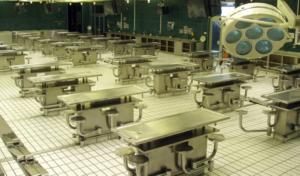On the Burch study abroad trip we visited many places and talked to people who have had a profound impact on and place within healthcare both globally and within Scotland. I enjoyed all of them aside from one–the Thiel Cadaver Center at the University of Dundee. Why have I decided to write about it you may ask? I think discomfort is not only beneficial for growth in the medical system, it is imperative.

Walking by a crockpot full of processed bones, I felt a wave of nausea, but also a realization. I understood that although many were interested in this work (I was not among this group), it was not because it was enjoyable in the slightest. Instead, the work being done in the Thiel Cadaver Center and others like it is completed due to its necessity. This need is to both understand human anatomy fully and train the next generation of medical professionals in understanding the intricacies of the human body. At this facility specifically, we learned about the roughly 300 bodies stored at a time, how they are processed and studied, and how they ultimately benefit society.
An example of a benefit that we learned about included training for dentists, general surgeons, and undergraduate students in anatomy. The benefits of this training allow future health professionals to gain real-body experiences before operating and examining living patients. Risk is mitigated by this, and doctors become more confident with their technical surgical skills.
Although this trip was not enjoyable for me, the medical world is often indebted to experiences like the center. Research and training which make health professionals uncomfortable are often the most effective. Real world situations and patients don’t often get second chances, but by training and fine-tuning surgical skills and anatomical understandings, the center provides a service to doctors which allows their work to become more dependable. Ultimately, patients and the general public are indebted to those who devote their experiences, no matter how uncomfortable, to healthcare.
